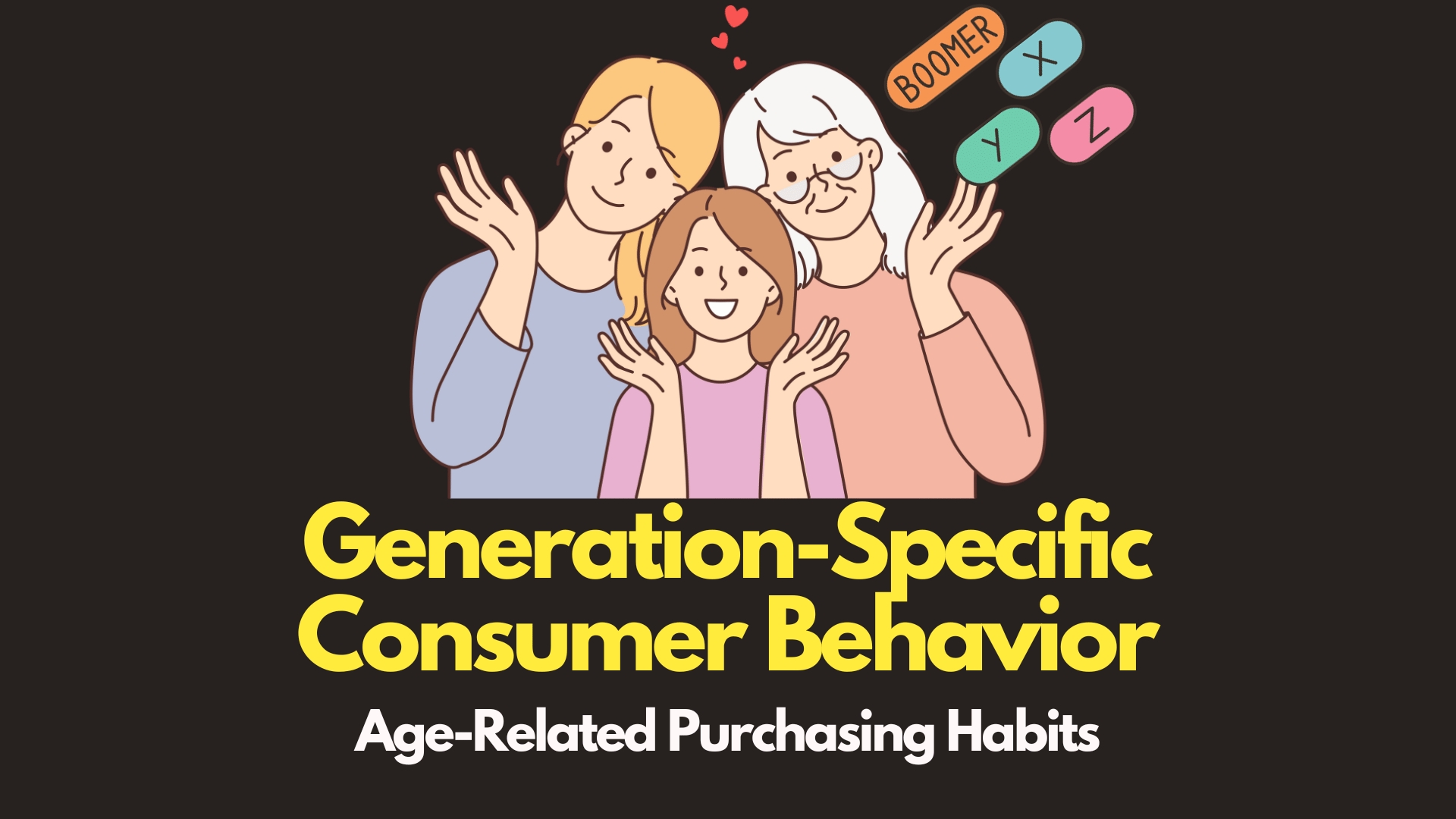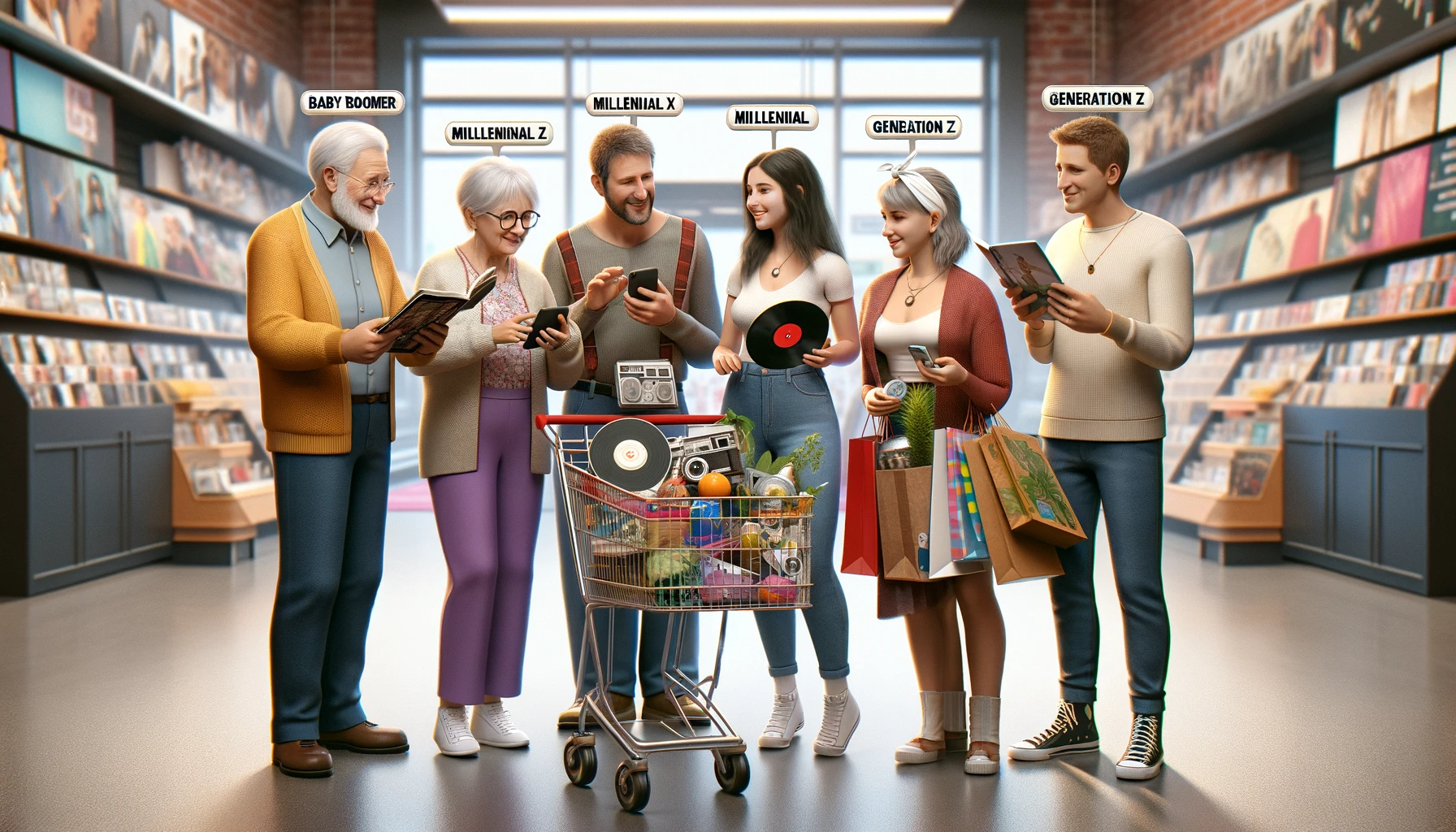Published
- 9 min read
Generation-Specific Consumer Behavior Trends

Generation-Specific Consumer Behavior Trends: A Deep Dive into Age-Related Purchasing Habits
Understanding the intricate differences in consumer behavior across various generations is vital for businesses aiming to create targeted marketing strategies. With each generation comes a unique set of values, experiences, and technological adaptability that influence their purchasing habits. In this article, we’ll explore the nuances of generation-specific consumer behavior trends and how they shape the retail landscape.
| Key Takeaways |
|---|
| 1. Generational cohorts exhibit distinct purchasing habits influenced by their unique experiences and values. |
| 2. Sustainable consumption behaviors are observed moderately across Generations X, Y, and Z. |
| 3. There is a variance in single-channel and cross-channel shopping preferences among different age groups. |
| 4. Tailored marketing strategies are essential to cater to the diverse behavioral intentions of consumers from various age brackets. |
| 5. Factors such as practicality, trust, and motivation play differential roles in online purchasing behavior among Baby Boomers, Generation X, and Millennials. |
Understanding the Generational Divide in Consumer Behavior
Baby Boomers: The Value-Driven Shoppers
Baby Boomers, born between 1946 and 1964, tend to value practicality and trust when it comes to their shopping habits. They are more likely to be loyal to brands that have established a sense of reliability and quality over time. Despite being less digitally native than younger generations, many Baby Boomers have embraced online shopping, albeit with a preference for companies they are familiar with.
Generation X: The Cross-Channel Consumers
Individuals born from 1965 to 1980, known as Generation X, exhibit a blend of traditional and digital shopping behaviors. They have a propensity for cross-channel shopping, integrating both online and offline experiences. This generation values a seamless transition between the physical store and the digital marketplace, favoring convenience and efficiency.
Millennials: The Digital Natives
Millennials, or Generation Y, born between 1981 and 1996, are the true digital natives. They are motivated by a mix of practicality and the pursuit of experiences. Millennials are more inclined to shop online but are also known for their support of brands that align with their personal values, such as sustainability and social responsibility.
Generation Z: The Ethical and Mobile Shoppers
The youngest cohort, Generation Z, born from 1997 onward, shows a strong preference for mobile shopping and values ethical practices and brand transparency. They are more likely to engage with brands that have a strong social media presence and that reflect their social and environmental values.
Analyzing the Impact of Consumer Behavior Trends on Businesses
Businesses must adapt to the evolving landscape of consumer behavior. By understanding the unique preferences and values of each generational cohort, companies can craft marketing strategies that resonate with their target audience. For instance, brands can leverage the trust and value-driven nature of Baby Boomers through loyalty programs and customer service excellence.
For Generation X, integrating online and offline channels to provide a seamless shopping experience can enhance brand loyalty. Companies should focus on user-friendly websites and efficient customer service to attract this demographic.
Millennials respond well to digital marketing campaigns that highlight a brand’s commitment to social and environmental issues. Engaging storytelling and interactive online experiences can captivate this generation’s attention.
To appeal to Generation Z, brands should invest in mobile optimization and leverage social media platforms to engage with this audience. Transparency and ethical practices are key to winning the trust and loyalty of Gen Z consumers.
The Role of Technology and Mindfulness in Consumer Behavior
In today’s digital age, technology plays a significant role in shaping consumer behavior. The integration of technology and mindfulness, for example, can influence purchasing decisions. Brands that offer products or services that promote mental well-being, such as alpha waves for enhanced study sessions, may attract consumers looking to improve their focus and relaxation.
Wrap-up
Understanding generation-specific consumer behavior trends is essential for businesses looking to create effective marketing strategies. Each generation brings its own set of values, experiences, and technological preferences that influence their purchasing habits. By tailoring marketing efforts to these unique characteristics, businesses can better connect with their target audiences and drive sales.
Sustainability and Consumer Choices Across Generations

Sustainability has become a significant factor in consumer purchasing decisions, with each generation displaying varying levels of commitment to environmentally friendly practices. The moderate sustainable consumption behaviors observed across Generations X, Y, and Z suggest that while there is an interest in sustainability, there is still room for growth in this area.
Baby Boomers: Eco-consciousness with a Twist
Baby Boomers, while not typically seen as the most environmentally driven generation, do show interest in sustainable products, especially when these products also offer long-term value and reliability. For businesses, this means highlighting the durability and cost-effectiveness of eco-friendly options can be a persuasive strategy for this demographic.
Generation X: Balancing Sustainability with Practicality
Generation X consumers are pragmatic and tend to look for a balance between sustainable choices and practical benefits. They are likely to be swayed by products that not only contribute to the well-being of the planet but also offer personal convenience and efficiency. Companies should emphasize the functional advantages of sustainable products to appeal to this generation.
Millennials: The Advocates of Green Consumption
Millennials are more vocal and committed to sustainability compared to older generations. They often make purchasing decisions based on a company’s social and environmental impact. Brands can connect with Millennials by showcasing their commitment to sustainable practices and by providing transparency in their production and supply chain processes.
Generation Z: The Demand for Authentic Sustainability
Generation Z has a keen eye for authenticity and demands genuine sustainable efforts from brands. They are quick to call out ‘greenwashing’ and seek products that are not only environmentally friendly but also ethically sourced. To engage with Gen Z, companies must ensure that their sustainability claims are backed by tangible actions and clear, accessible information.
The Influence of Cultural and Psychological Factors
Cultural and psychological factors play a significant role in shaping consumer behavior across different generations. For example, the impact of cultural factors on consumer behavior can vary greatly between generations, with older generations often holding more traditional views that can influence their purchasing decisions.
The Psychology of Discounts and Brand Loyalty
The psychology of discounts can have a varied effect on different age groups. While Baby Boomers might see discounts as a reward for loyalty, Millennials and Gen Z might view them as a savvy way to try new, sustainable brands without a full-price commitment. Understanding these nuances can help businesses create offers that are more appealing to their target demographic.
Emotional Connections and Purchasing Decisions
The role of emotions in purchasing decisions cannot be overstated. Each generation responds to emotional triggers differently, with Millennials and Gen Z often looking for an emotional connection to the brand’s values, while Gen X and Baby Boomers might respond more to nostalgia or trust in brand longevity.
Leveraging Technology to Enhance Shopping Experiences
With the rise of e-commerce, understanding the emerging technologies and their impact on e-commerce is crucial for businesses. Baby Boomers may appreciate technologies that simplify the online shopping process, while Gen Z might look for cutting-edge innovations that offer a unique and personalized shopping experience.
Wrap-up
The consumer behavior trends of different generational cohorts provide valuable insights for businesses looking to optimize their marketing strategies. From sustainability to technology, understanding the preferences and values of each generation can lead to more effective engagement and increased customer loyalty. For further insights into consumer behavior and how it affects business strategies, explore the wealth of resources available at Gufito.com.
The Evolution of Shopping Channels and Consumer Preferences
The digital revolution has transformed the way consumers of all generations interact with brands and make purchases. However, the extent to which each generation utilizes and combines different shopping channels can vary significantly, reflecting their unique behaviors and preferences.
Baby Boomers: Embracing Digital with Caution
Baby Boomers have gradually adapted to the online shopping world, though they often remain cautious. They prefer to use digital channels for researching products but may complete their purchases in traditional brick-and-mortar stores. For businesses, this means providing detailed product information online while maintaining a strong offline presence can effectively cater to this demographic.
Generation X: The Hybrid Shoppers
Generation X consumers are adept at using both online and offline channels. They often start their shopping journey online, looking for the best deals and reading reviews, but also enjoy the tactile experience of in-store shopping. Retailers can attract this cohort by offering a seamless omnichannel experience that allows for easy transition between online browsing and in-store purchasing.
Millennials: Prioritizing Online Convenience
With a strong preference for online shopping, Millennials value the convenience and variety that digital platforms offer. They are more likely to use mobile apps and social media for shopping, influenced by user-generated content and peer reviews. Companies can engage Millennials by optimizing their online presence and ensuring their e-commerce platforms are user-friendly and mobile-responsive.
Generation Z: Mobile-First and Socially Engaged
Generation Z has taken mobile shopping to the next level, often using smartphones as their primary shopping device. They are highly influenced by social media trends and the online presence of brands. To tap into this market, businesses should focus on creating a dynamic mobile shopping experience and actively engaging with consumers on social platforms.
The Intersection of Consumer Psychology and Shopping Behavior
Understanding the psychological underpinnings of consumer behavior is crucial for tailoring marketing efforts to different generations. The hidden psychology behind brand loyalty can help businesses foster a strong connection with customers, while the power of psychological triggers in advertising can be leveraged to prompt desired responses from specific age groups.
Decision-Making Processes Across Generations
The consumer decision-making processes can differ greatly between generations. Baby Boomers might take a more methodical approach, weighing the pros and cons, while younger generations, like Millennials and Gen Z, may make quicker decisions influenced by trends and social proof.
The Role of Brand Perception and Consumer Behavior
How consumers perceive a brand significantly affects their purchasing behavior. Understanding consumer behavior and brand perception can provide businesses with insights into how to position their products and communicate their values effectively to different generational audiences.
Conclusion
The retail landscape is continuously evolving, with generation-specific consumer behavior trends playing a critical role in shaping the future of shopping. From Baby Boomers’ cautious digital adoption to Generation Z’s mobile-first approach, businesses must adapt their strategies to meet the diverse needs and preferences of each age group. By leveraging insights into each generation’s unique consumer behavior, companies can create personalized experiences that resonate with their target audience and foster long-lasting customer relationships.